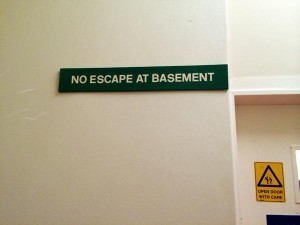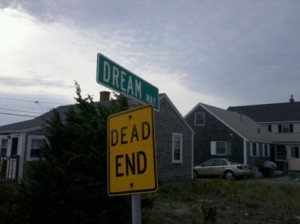Rachel Neumeier's Blog, page 324
October 9, 2015
Cozy SFF?
A post at Black Gate by Violette Malan
I’ve often talked about crossovers, and mixed genre novels, but I don’t think we have anything in our world that’s the equivalent of the cozy mystery. Read on, and let me know what you think.
Malan defines cozy mysteries thus:
There will be a murder, which often takes place “off stage” and of which no graphic or gory details are given.
There is a small circle of suspects, all or most of whom have a motive for the murder.
The sleuth is an amateur, usually a young woman in her twenties or early thirties.
She is usually, but not always, a suspect, though she may be cleared of suspicion quite early.
A plausible excuse is given for why she gets involved in solving the mystery. For example, she has to clear herself, or a friend of suspicion, or she believes the police are focussing their attention in the wrong direction, or, the police don’t think a murder has taken place.
Usually, but not always, our heroine has a “friend on the force” or some other type of professional criminalist who helps out.
She has some romantic involvement with one or more of the other characters.
She is instrumental in solving the crime, that is, she doesn’t just figure it out for the cops, but actually confronts the killer, often finding herself in danger.
Okay, first, I like this. I mean, as a set of expectations for cozy mysteries. Although one of my favorite details about Patricia Greenwood’s second Wisteria Tearoom mystery, An Aria of Omens, is Greenwood’s refusal to force her protagonist to confront the bad guy and put herself in danger, which is generally, to be frank, a deeply stupid thing for the protagonist to do and definitely something that makes me as a reader roll my eyes. So I would like to ditch that particular convention if at all possible. But then, I did feel that this particular book was not as “cozy” as the first book, and perhaps that is partly why.
Okay, anyway, in her second post on the topic, Malan said:
Sarah Avery reminded me of a cozy convention I’d forgotten, that the protagonist is never in any real danger. That doesn’t hold true for any subgenre of either Fantasy or SF, where every character is playing for keeps. As readers, we might feel sure that the main character(s) won’t die, but we often find that living has cost them a great deal.
So, are there Fantasy and SF equivalents to the cozy mystery?
One suggestion we batted around a little was the idea of the “intimate” Fantasy novel. This would be one in which the personal stakes might be very high, but in which the global stakes are minor, or don’t exist at all. This is less unusual for our genres then it used to be.
I agree that an integral part of the cozy mystery subgenre is that the reader should not feel too stressed out about the fate of the protagonist. However, I disagree with the notion that you can’t have this safety net in SFF. Of course you can. Was anybody ever worried about the outcome in Sharon Shinn’s Troubled Waters? Anybody nervous that the protagonist might die? The male lead? Close friends of the protagonist?
Was anybody afraid that one of the children might die, or actually be given to that horrible guy from the other country?
Anybody doubt that the romantic subplot would work itself out? Yes? Speak up!
Of course not, to all of the above.
So I have a suggestion: Cozy mysteries are the equivalent of comfort-read fantasy. I mean here, the kind of warm and fuzzy fantasy novels that are comfort reads the first time you read them, because at no time are you really concerned that the outcome might be terrible. It won’t be, and you can tell.
So are there any plotting conventions for cozy fantasy? And if not, is it really comparable to cozy mystery?
I would say that cozy fantasy would probably share the following characteristics, which are indeed similar to cozy mystery:
If anything gory takes place, it happens offstage or is not described in detail.
There will be a small circle of important characters, none of whom are likely to die.
The protagonist is a young woman (is that usually the case?).
There is an important romance subplot.
The protagonist is instrumental in solving the Problem in the book.
At no point is the reader worried about the main character or the male lead dying, or about really horrible things happening.
The romance works out and there is a happy (or happy enough) ending
Is that enough to declare that this kind of fantasy is similar to cozy mysteries? Did I leave anything out?
Incidentally, Malan says she can’t think of any SF equivalent to cozy mysteries. These do not leap to mind, but, maybe some of the Liaden books? Here I’m thinking of the Pilot’s Choice stories, mostly. Does it work even if other books in the universe are not really the same type?
How about A Civil Campaign? Again, mostly these are space opera, but this particular book might count, do you think?

So, hey, is “The Martian” based on a true story?
My question is, can this be real? Is it possible . . . is it even *vaguely* possible . . . that some actual people out there think that “The Martian” might have been based on a real story?
Or are they all faking it?
Incidentally, the comments at that Buzzfeed post are also funny, so if you have a moment, read through those, too.

October 8, 2015
Sometimes signs are a little more meaningful than perhaps intended
Every now and then someone posts a particularly entertaining sign on Twitter or somewhere — I don’t mean the one that are meant to be funny, like a sign that says “Don’t read this sign” or whatever. I mean, signs that were posted (one supposes) in earnest, but take on a meaning that perhaps the person responsible for the sign did not intend.
Signs like these:
Oookay. You could definitely write a story around that sign. THERE IS NO ESCAPE IN THE BASEMENT. No, indeed. This is actually making me think of movies and tv more than books — and sometimes the person really does escape — I’m thinking of “Scream,” I think, and, oh, that one scene in that great Firefly episode where they steal medical supplies from that hospital and wind up running down many, many stairs to get away from the men with blue hands.
But seriously, if you saw that sign in a building, wouldn’t you wonder for a moment whether you’d stepped into a horror movie? Little chill down the spine there, yes?
Okay, and this one:
Another horror movie vibe here! Who didn’t just think of Stephen King’s Needful Things, eh? This picture would be a great cover for that story, with just a little tweak to the sign. Except seriously, “Normal Things” is even creepier than “Needful Things,” isn’t it?
Especially in this particular storefront. Brr.
Okay, how about this one?
Make you feel a bit odd to live there, wouldn’t it? Kinda makes you want to put at least a footpath out of the dead end . . .

October 7, 2015
On not giving up
Here’s a thought-provoking post by Kameron Hurley: ABSOLUTE ZERO — THE TEMPERATURE AT WHICH WRITERS GIVE UP
Kameron Hurley is of course the author of The Mirror Empire, which sounds way too dark for me in ways that make me reluctant to even glance at it. On the other hand, this book got quite a lot of attention and definitely gave Hurley a professional boost, so a lot of readers obviously really liked it. The second book, Empire Ascendant, just came out this week, I believe.
So, she says:
It took me sixteen years between my first short story sale and first novel sale, and twenty years and six published novels before I had a single year’s income that looked anything like a living wage. I still don’t write full time. The day job pays all.
Don’t I get discouraged? Don’t I look at the six and seven figure deals that some debut novelists get and cry into my cornflakes?
Sure.
But I know something many new writers, and debut novelists, don’t know: you are probably going to quit. You probably aren’t going to have a publishing contract in ten years. Those are the cold equations. Do some people get lucky right out the gate? Sure. Million dollar contracts for books that actually earn out. Six figure contracts for books that go on to be hits and give you royalties enough every year to live on. It happens. It’s not impossible.
But for the 99.9%, it’s not realistic. It’s a dream. For the 99%, like me, you are working book check to book check, hoping that the next project is the one that takes off.
I don’t know. I don’t exactly disagree, because a million dollar contract that earns out, I don’t spend any time dreaming about that, because Hurley is right. As if. For everybody who’s not a celebrity, that’s truly not at all realistic.
Also, the way advances are broken up, it’s not at all unusual to get a perfectly decent advance, but it doesn’t amount to a living wage because it’s spread out over three or more years. So Hurley is right: it’s realistic to expect book income to be nice-but-not-a-living-wage for quite some time.
But I do think a lot of anyone’s perception of all this — of luck and the success-lottery and how most writers fail and all like that — has very little to do with the objective real world. I think that perception is much more about someone’s own personal temperament and beliefs about life than it is about objective reality.
I think that it is important for a writer’s peace of mind to believe that:
a) Good things that happen to you count as much as good things that happen to other people;
b) Bad things happen to everybody, they’re just not as visible;
c) You can define success such that it is achievable; and
e) Envy is something you do to yourself. You can choose whether to be glad for another writer’s success or resent it.
I expect that a lot of writers do quit, for all kinds of reasons, including because they hit hurdles they didn’t expect. It is important to keep going if you’ve hit a hole where nothing you write sells, and I certainly believe it is true that most writers are going to have years like that. I know any number of writers who knocked it out of the park with their debut but couldn’t sell their second novel or series; who were doing fine to begin with but then couldn’t place anything for three or four years; who were dropped by their first publisher; who had to start writing under a pseudonym because their first series didn’t sell well. All kinds of problems. But this:
… you are going to hit far more roadblocks and hurdles once you have that first novel published, and more again with the second. It does not, in truth, get any easier.
Seems unnecessarily pessimistic to me. Because yes, actually it does get easier, or at least it can get easier, in all kinds of ways.
I mean, you may hit snags, but as you go on writing, you definitely learn that you can indeed finish a novel. You learn that you can work out the plot even if you have no idea where the story is going when you start it. You learn to trust your ability to write a book, and take a critique, and revise. Those can be serious doubts when you’re writing your second novel under a deadline, maybe your third, but by the time you’re working on your sixth, you have mostly likely learned to trust yourself. That honestly does make writing much easier.
You have readers who love your work, and tell you so. That definitely makes writing easier.
And, though the experience of writing is different for everyone, by the time you’re writing your sixth book . . . or your tenth, or whatever . . . I expect you will have probably hit a hole and more than likely recovered from it, too, so you know that can happen. Both the hole and the recovery.
My personal recommendation for both the moments of pessimism and the moments of celebration; both the times you fall into a hole and the times you climb out: really good dark chocolate. And a spaniel.

October 5, 2015
What people in France in 1900 pictured for the year 2000
Via File770, from the Washington Post, an article by Ana Swanson featuring artists’ conceptions of life in the year 2000.
Some are not very serious; some are admirably prescient, and the whale-bus is the single most appealing image of them all. I want one of those!

Scary book covers
Since it’s October, time for some themed posts! So, a top ten list: Disturbing Book Covers. Some of these make me want to pick up the book. Some make me want to back away slowly. I would say that some are good covers because they make you want to pick up the book AND they relate well to what the book is about. Others are utterly dreadful covers because they don’t do either job. So, here we go:
10. 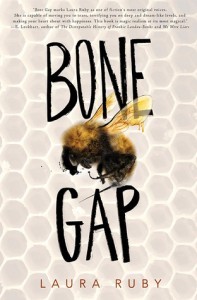 I would like to read this because of the reviews I’ve seen, but the title combined with the cover are a turn-off for me. I find this a creepy cover even though I am not bothered by insects and routinely capture and release real arthropods that get into the house. I don’t loathe this cover, but I don’t think it does the book any favors, either.
I would like to read this because of the reviews I’ve seen, but the title combined with the cover are a turn-off for me. I find this a creepy cover even though I am not bothered by insects and routinely capture and release real arthropods that get into the house. I don’t loathe this cover, but I don’t think it does the book any favors, either.
9. 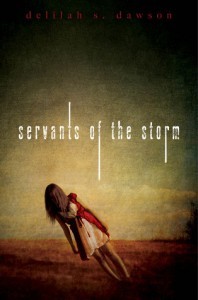 I sort of like this creepy cover. It makes me want to pick up the book and read the back.
I sort of like this creepy cover. It makes me want to pick up the book and read the back.
8. 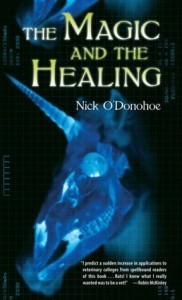 I hate hate hate this cover, which is one of the very worst for “does not fit the book” and also is disturbing and ugly to look at.
I hate hate hate this cover, which is one of the very worst for “does not fit the book” and also is disturbing and ugly to look at.
7. 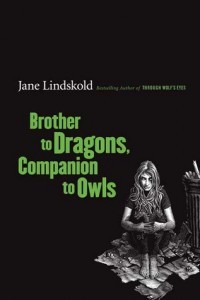 If possible, even worst than #8. I love both these books, btw. I just detest these covers.
If possible, even worst than #8. I love both these books, btw. I just detest these covers.
6. 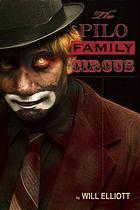 I like this creepy clown. It helps that I have no idea what the book is like, so if the cover is inappropriate, I can’t tell. I’ve always liked scary clowns.
I like this creepy clown. It helps that I have no idea what the book is like, so if the cover is inappropriate, I can’t tell. I’ve always liked scary clowns.
5. 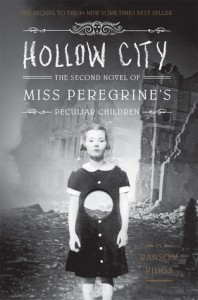 I can’t tell if this is creepy or just peculiar. I read the first book and kinda liked it, but actually I liked it better before the protagonist began to figure out what was going on.
I can’t tell if this is creepy or just peculiar. I read the first book and kinda liked it, but actually I liked it better before the protagonist began to figure out what was going on.
4. 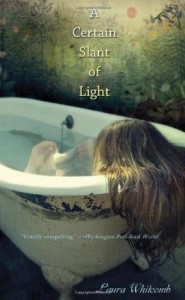 The dead girl cover trend was pretty disturbing, but actually I thought this cover was effective and appropriate for this story, which I really loved. The sequel didn’t work for me, though.
The dead girl cover trend was pretty disturbing, but actually I thought this cover was effective and appropriate for this story, which I really loved. The sequel didn’t work for me, though.
3. 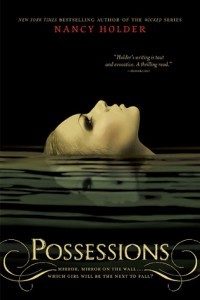 Spookiest floating person ever.
Spookiest floating person ever.
2. 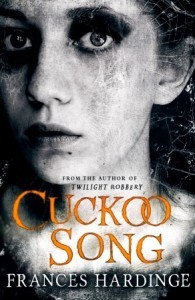 This is a very creepy, disturbing cover. Too much so for the book, imo.
This is a very creepy, disturbing cover. Too much so for the book, imo.
1. 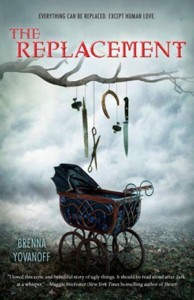 I have always thought this was a masterpiece in the “creepy cover” competition. Never read the book, though I keep kind of wanting to.
I have always thought this was a masterpiece in the “creepy cover” competition. Never read the book, though I keep kind of wanting to.
What do you think? Do creepy covers turn you off, intrigue you, or can it go either way? Do any of these particularly flip the “back away slowly” switch for you?

Archon 2015
So, good times at Archon! I caught up with people I knew — Walt Boyes and Joy Ward, for example; they’re dog people as well as writers, so we have that in common.
Plus, Walt and I were both on the Designing Alien Cultures and Species panel and turned out to admire many of the same works — CJC’s Foreigner, “Katherine Addison’s” The Goblin Emperor — I bet between the two of us we got the whole roomful of attendees to buy The Goblin Emperor. Hope so, although it’s always a bit risky to raise expectations sky-high, but still. This was my favorite panel, obviously — I mean, it would be. Of course my emphasis is on how instinct informs culture.
All the panels went well, though, even the Paranormal vs Supernatural panel, where we all agreed that definitions can go in all kinds of different directions. My own feeling is that your personal idiosyncratic definition of “paranormal” can be all very good and precise, but if you get too far away from the types of books that readers are actually shelving under “paranormal”, then it hardly matters how much more precise your definition is — so definitions have to follow usage. Anyway, the panel wandered a bit, which is liable to happen when the title doesn’t impose a clear direction. I met Sarah Jude, whose mystery/horror novel The May Queen Murders is coming out next spring; and Claire Ashgrove, who writes stories involving the Knights Templar, among other things.
Every single panel was well attended. The Harassment panel on Friday night could have turned into either an Airing of Grievances or a political argument, but actually stayed pretty much on topic and also fairly civil. Personally, I hope I never see another panel titled “Harassment and the Female Fan”, as though women are always targets and never offenders, but the actual harassment policy of the convention wasn’t written with that assumption. It was quite interesting to talk to people later about the evolution of Archon’s harassment policy and how that issue has changed over the past few years.
I was hoping for maybe ten or so attendees for the Trends in YA panel, not because the topic isn’t a draw, but because 11:00 AM on Sunday is a tough slot. Actually I would say by the end maybe 20 people were there, not counting panelists, so that was pretty good. Kasey MacKenzie and I were both on that panel, so it was good to catch up with her. Also Deborah Millitello, who I’ve also met before.
Incidentally: Trends in YA. We all agree: paranormal is dead, dystopia is dead, fantasy is okay, horror is okay, SF is up, contemporary is way up, especially if there’s a spy/criminal/con game aspect to the story. We also all agree: gotta be careful writing to a trend, because the market is likely to be utterly saturated with whatever by the time you’re shopping your completed book around. But if you’re flipping a coin between paranormal and contemporary right now, contemporary is the way to go, because most likely that’ll be up for several years yet. I met no fewer than three writers during this small convention who have switched to contemporary because they are having trouble placing paranormal-ish types of stories.
We ALSO all agree, if you write something that’s not marketable right now, wait five years or so, because these things certainly do come and go. If you’re waiting for the market to turn back around toward paranormal, nothing stops you from waiting for that while writing something else in the meantime.
Let me see, let me see. The masquerade was good; I didn’t take any pictures, sorry. My favorite: The Christmas scene. Cutest: possibly The Addams Family, especially Wednesday. The Lego Riddler was hilarious; you see how important it is to keep up with movies? If I hadn’t seen the Lego Movie, I would have been baffled.
Also! Yes, I got a fair bit of work done. That was a major reason I stayed up there rather than driving back and forth: when the convention doesn’t start rolling till ten in the morning, a lark has plenty of time to work on other stuff before leaving the hotel.

October 1, 2015
Eight Perceptions of Probability
From Ben Orlin at Math With Bad Drawings, an entertaining look at the highly disparate ways in which different professions look at probability.
I like them all, and two are actually SF-related, so that’s keen. But it’s possible that my favorite is:
That is so, so true. For the media, Everything Must Be A Crisis.
Click through and check out the Millennium Falcon one.
An extra note on probability: I recently had a conversation that went like this (via texting, so I didn’t have to do the math in my head):
Friend: So the x-ray shows six puppies!
Me: Six! Wow, that’s great!
Friend: I really want girls! I hope they’re not all boys!
Me: Well, there’s only about a 1.5% chance they’re all boys.
Friend: What’s the chance of just one girl?
Me: About 9.5%. There’s about a 23% chance there are two girls, and about a 31% chance of three girls. So there’s about a 65% chance of three or more girls.
Friend: Great!
Me: Probability: a way of going wrong with confidence!
There were in fact three girls and three boys in the litter, which was born last Sunday. So I’ll leave you with a row of cute little puppies:
The three on the right are the girls. Just like little sausages with noses, at this age. They’ll be just overwhelmingly cute in six weeks, though!

Wait, you think this is somehow a good idea?
So, if you were on social media last night, I bet you got an earful about this prospective new Yelp-like rating system, Peeple.
It is a system for rating, get this, people. Coworkers, acquaintances, friends, neighbors, anybody whose cell phone you have or can look up. You give people one to five stars, just like you were rating a book on Goodreads.
Here is a Washington Post article by Caitlin Dewey about that:
It’s a good article — I like how Dewey starts off sounding almost neutral as she describes this proposed new app, and then says:
Unfortunately for the millions of people who could soon find themselves the unwilling subjects — make that objects — of Cordray’s app, her thoughts do not appear to have shed light on certain very critical issues, such as consent and bias and accuracy and the fundamental wrongness of assigning a number value to a person.
To borrow from the technologist and philosopher Jaron Lanier, Peeple is indicative of a sort of technology that values “the information content of the web over individuals;” it’s so obsessed with the perceived magic of crowd-sourced data that it fails to see the harms to ordinary people.
Where to even begin with those harms?
So. Founder of Peeple, Julia Cordray, and Co-founder Nicole McCullough, have no doubt been getting quiiiite the earful about this. One can’t help wondering how hard it would be to find out their cell phone numbers and jump right in using this rating system as soon as it becomes available. Maybe they will change their minds, maybe their capital will dry up at the last minute — they apparently have over $7 million in capital so far — maybe this app won’t actually appear. Which would, obviously, be the best outcome — obvious to everyone but Cordray and McCullough and their backers.
Where once you may have viewed a date or a teacher conference as a private encounter, Peeple transforms it into a radically public performance: Everything you do can be judged, publicized, recorded.
“That’s feedback for you!” Cordray enthuses. “You can really use it to your advantage.”
They say things like this and yet they have backers. Amazing. Astounding. Unbelievable, except there it is, apparently not a hoax. That this will go forward unchanged: I don’t believe that’s possible. That anyone needed a storm of negative reaction to see what a complete disaster the Peeple app would be as proposed . . . I have a hard time believing that, too.
Out of curiosity, has anybody ever proposed such a completely horrible app before in the (admittedly short) history of social media? Because I can’t even imagine.

September 30, 2015
When to leave your agent
I should say first: I have no inclination to leave *my* agent. But this post by Nathan Bransford caught my eye:
How to know when to leave your agent
And the primary reason it caught me is: Nathan did not include an important situation I recently heard about from another writer.
Here are Nathan’s “good reasons” for leaving your agent:
1. Your agent has behaved unethically
2. Your agent has gone incommunicado
3. Your gut is telling you it’s time to go
And #3 there is so vague — he discusses it more in the actual post, of course — that it covers the situation I heard about, I guess. But it is *so* vague. Let me explain the particular situation I heard about:
Another writer recently told me that her agent loved her first series, placed it with a good publisher, and everything looked good. But the agent hated the next four different books she wrote and told her they were unsalable, that they were unmarketable, that there was nothing to do but toss each book in the trunk and write something else.
Eventually this writer left that agent. As soon as her latest “unsellable, unmarketable” book started being shipped around, Big Five publishers started making offers for it.
The lesson: Your agent has to believe in your work. Of course it wasn’t the agent’s fault that his taste diverged from this author’s later work. But it sure was unfortunate that he was seeing “unmarketable” when the story was really just not to his taste. It was definitely his choice to decide the books weren’t marketable without trying to market them.
Of course it crushes a writer’s confidence to hear her work is not good enough to even bother sending out — four times! — after writing a debut series that did well. I am perfectly sure it took guts for this author to leave her agent, but it was absolutely the right decision, obviously.
Nathan also includes “bad reasons” to leave your agent, so the whole post may be worth a look. But I thought I’d mention this particular situation because I hadn’t previously heard of this problem coming up between an author and an agent, and so here you go: it can happen, and parting ways was both possible and the right decision.


